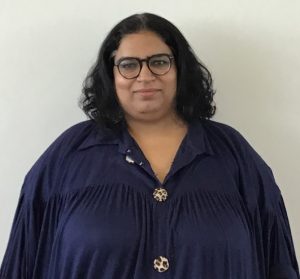Academic Spotlight: Dr Rubina Jasani
Dr Rubina Jasani is a Programme Director for the Intercalated BSc in Global Health and Lecturer in Humanitarianism and Conflict Response at HCRI. Rubina convenes Anthropology of Violence and Reconstruction and Mental Health and Psychosocial Support in Humanitarian Crises on HCRI’s postgraduate degrees. She also teaches War, Migration and Health on the iBSc in Global Health.
As an anthropologist, Rubina was always interested in understanding everyday life. “What I do in my courses is turn the gaze and look at it from people’s perspective,” she explains. Rubina brings the understanding of people’s experiences to conversations on humanitarian theory, feminism and post-colonialism.
As an institute that thrives on its interdisciplinary approach, Rubina explains that HCRI’s strength lies in the staff’s commitment to the study of humanitarianism, which comes through in all of their teaching.
Rubina’s research can be divided into three broad inter-related areas – Violence, Displacement and Identities, Gender and Sexuality and Suffering and Healing. “I’m trying to shift the narrative by bringing the everyday, but I’m also theoretically trying to bring in perspectives, from a post-colonial, de-colonial kind of context which are questioning the hegemonic gaze ” she explains.
Rubina’s most recent research work is on Politics of desires and Muslim widowhood in post-colonial India’s communal conflicts. Drawing on feminist debates coming out of the Arab world. “ The research is trying to ask what role does silence play in the development of agency. I’m not trying to say that these people are not victims, but what I’m trying to show is how these women are also agents and making very pragmatic choices, given the kind of challenges that life is posing on them,” she explains.
Together with Dr Jenna Murray de López, Rubina founded the project ‘No Recourse! PEER Research Project’ in partnership with Women Asylum Seekers Together (WAST) in Manchester. Rubina explains: “at HCRI we are always talking about conflict in other places, we are talking about South Sudan, Uganda, DRC but what we are not really doing is looking how these places are also in Manchester through forced migration.”
The aim of the project was to do something different through co-creation of knowledge. “Why can’t these women produce knowledge and tell their stories?” Rubina asked. The project allowed asylum-seeking women to train as researchers, which lead to 10 of them, graduating from the University of Manchester in December 2018. They used their research skills to create educational data and material for medical schools to increase awareness and knowledge around rights of refugees and asylum seekers.
Rubina and Jenna received an award for outstanding contribution to Widening Participation at the University of Manchester in May 2019 for their work on ‘No Recourse!’. “We drew a lot of inspiration from the women who took part in the project,” Rubina says. One graduate from their course has gone on to do a foundation year and gained funding to complete a psychology degree at Oxford University.
Rubina encourages her students on courses at HCRI to think about class, race, sexuality diversity and complex colonial histories. “I think it comes down to my own experience of being a brown Indian woman in this space,” she reflects. Rubina wants them to think critically about privilege, location and how does one go about developing that critical voice to make the world a better place.



0 Comments